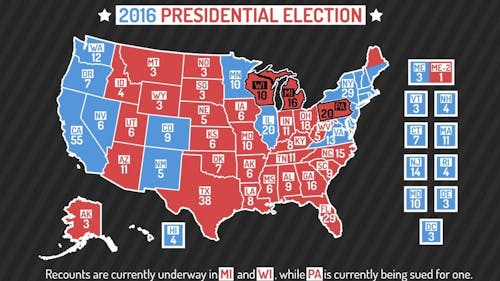Rutgers students say election recount waste of effort

In wake of Donald J. Trump's recent victory, many are calling for a recount of delegates.
Out of 4,687 statewide general elections between 2000 and 2015, just 27 were followed by recounts, according to FiveThirtyEight. With the recounts that do occur, few reverse initial election results.
The recount would be valid if there were problems suspected in the process of the election, said Brina Book, a School of Environmental and Biological Sciences sophomore. Book said she heard plenty of theories about rigging.
The recount is a waste of time and money, said Zhi Liang, a School of Environmental and Biological Sciences sophomore.
“Trump and his group have devoted themselves to the preparation of becoming president,” he said. “If they recount and Hillary (Clinton) wins, then the time and money put to that preparation will go to waste.”
The recount should be conducted only if some evidence can be found that Trump cheated in the election, Liang said. If the evidence is conclusive, that would be the only case in which a recount should be in order.
Even if an external third party hacked the voting machines used to tally votes, a recount would not support or deny that hacking occurred, according to the Washington Post.
People are pushing for a recount because they are upset about the outcome of the election, said Kelsey Hayes, a School of Arts and Sciences sophomore.
“I’m biased because I’m a Republican, but people want to find some hope for their opinion and want to hope that the election will go their way,” she said. “So this is their way of hoping.”
Hayes is in favor of the Electoral College, but she does not support the winner-takes-all system some states have employed. Hayes believes the Electoral College votes should be broken up within states based on a percentage system.
The debate is about the weight of the Electoral College versus the weight of the popular vote, said Mark Monaghan, a Mason Gross School of the Arts junior.
Monaghan said he is in favor of keeping the Electoral College.
If the Electoral College were eliminated, states with larger populations would have a greater say and candidates would dedicate more time to population-dense regions to maximize their voter outreach, Hayes said.
Monaghan said that the media picks and chooses facts in order to broadcast a particular opinion to its viewers, showing how the popular vote can further be skewed.
“I feel like a lot of the plans from both candidates aren’t known fully unless you go and do your own research, but I feel like a lot of people don’t do that,” he said.
The crux of the issue is not whether or not the votes should be recounted, but rather the legitimacy of continuing to use the Electoral College in elections, said Samuel Famosa, a School of Arts and Sciences junior.
The last time the losing candidate received the majority popular vote was in 2000. A recount occurred in the swing state of Florida, when Democratic Presidential nominee Al Gore flipped 1,247 votes from Republican nominee George W. Bush, according to FiveThirtyEight.
The recounted votes were not enough to flip Florida to the Democratic Party, which would have resulted in Al Gore winning the presidency, according to FiveThirtyEight.
With the recount looking less and less likely, protesters are turning to the Electoral College itself to push for a reversal of the decision.
Protesters are calling for “faithless electors,” electors that vote against what the population vote decided. Alexander Hamilton set in place this concept in Federalist Paper 68, saying that it is an elector’s responsibility to check and balance the citizens if a dictator were to rise to power, according to Yale.
“The Electoral College is necessary because I don’t entirely trust the popular vote. It’s somewhat skewed by a lot of information we get,” he said. “A lot of the facts aren’t quite known going into the booth,” Monhehan said.
Bushra Hasan is a School of Arts and Sciences sophomore majoring in cell biology and neuroscience. She is a correspondent for The Daily Targum. Follow her on Twitter @bushrafhasan for more.



